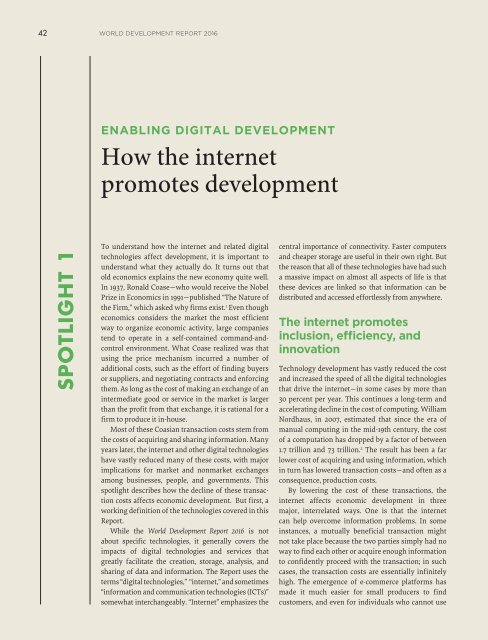Authorized Authorized
eERqs
eERqs
You also want an ePaper? Increase the reach of your titles
YUMPU automatically turns print PDFs into web optimized ePapers that Google loves.
42 WORLD DEVELOPMENT REPORT 2016<br />
ENABLING DIGITAL DEVELOPMENT<br />
How the internet<br />
promotes development<br />
SPOTLIGHT 1<br />
To understand how the internet and related digital<br />
technologies affect development, it is important to<br />
understand what they actually do. It turns out that<br />
old economics explains the new economy quite well.<br />
In 1937, Ronald Coase—who would receive the Nobel<br />
Prize in Economics in 1991—published “The Nature of<br />
the Firm,” which asked why firms exist. 1 Even though<br />
economics considers the market the most efficient<br />
way to organize economic activity, large companies<br />
tend to operate in a self-contained command-andcontrol<br />
environment. What Coase realized was that<br />
using the price mechanism incurred a number of<br />
additional costs, such as the effort of finding buyers<br />
or suppliers, and negotiating contracts and enforcing<br />
them. As long as the cost of making an exchange of an<br />
intermediate good or service in the market is larger<br />
than the profit from that exchange, it is rational for a<br />
firm to produce it in-house.<br />
Most of these Coasian transaction costs stem from<br />
the costs of acquiring and sharing information. Many<br />
years later, the internet and other digital technologies<br />
have vastly reduced many of these costs, with major<br />
implications for market and nonmarket exchanges<br />
among businesses, people, and governments. This<br />
spotlight describes how the decline of these transaction<br />
costs affects economic development. But first, a<br />
working definition of the technologies covered in this<br />
Report.<br />
While the World Development Report 2016 is not<br />
about specific technologies, it generally covers the<br />
impacts of digital technologies and services that<br />
greatly facilitate the creation, storage, analysis, and<br />
sharing of data and information. The Report uses the<br />
terms “digital technologies,” “internet,” and sometimes<br />
“information and communication technologies (ICTs)”<br />
somewhat interchangeably. “Internet” emphasizes the<br />
central importance of connectivity. Faster computers<br />
and cheaper storage are useful in their own right. But<br />
the reason that all of these technologies have had such<br />
a massive impact on almost all aspects of life is that<br />
these devices are linked so that information can be<br />
distributed and accessed effortlessly from anywhere.<br />
The internet promotes<br />
inclusion, efficiency, and<br />
innovation<br />
Technology development has vastly reduced the cost<br />
and increased the speed of all the digital technologies<br />
that drive the internet—in some cases by more than<br />
30 percent per year. This continues a long-term and<br />
accelerating decline in the cost of computing. William<br />
Nordhaus, in 2007, estimated that since the era of<br />
manual computing in the mid-19th century, the cost<br />
of a computation has dropped by a factor of between<br />
1.7 trillion and 73 trillion. 2 The result has been a far<br />
lower cost of acquiring and using information, which<br />
in turn has lowered transaction costs—and often as a<br />
consequence, production costs.<br />
By lowering the cost of these transactions, the<br />
internet affects economic development in three<br />
major, interrelated ways. One is that the internet<br />
can help overcome information problems. In some<br />
instances, a mutually beneficial transaction might<br />
not take place because the two parties simply had no<br />
way to find each other or acquire enough information<br />
to confidently proceed with the transaction; in such<br />
cases, the transaction costs are essentially infinitely<br />
high. The emergence of e-commerce platforms has<br />
made it much easier for small producers to find<br />
customers, and even for individuals who cannot use


